Two leading Gold Coast figures are vowing to work together on key issues - and they are adamant they can drive change. READ THE FULL REPORT
Outgoing CEO Dale Dickson was renowned for running a separate office to the Mayor, focusing on the administrative detail, staffing and coalface issues.
On introducing Mr Edwards to the media on his first day of work, Councillor Tate clearly set out the CEO’s job requirements to turbo-charge the economy.
Mr Edwards has since taken personal leave just days into his tenure.
“I’m looking forward to working with David,” Cr Tate said before Mr Edwards' break was announced. “I know he comes from delivering major projects for the state government.
“He has been exemplary. I would say in 12 months time when we look at some of the ideas that David and I will take to council, it’s timely for us to make our city resilient, broaden our economy, and recovering after this COVID.
“We’re in a good spot but we are going to take it to the next level.”
Mr Edwards was reluctant to address specific ideas like the Springbrook cableway or offshore cruise terminal at The Spit.
“I think I have a history of delivering projects but I’ve also got a history of tourism-related infrastructure,” he said.
“More importantly, what I’ve done in the past is engage effectively with stakeholders, so one of the first things I’ll be doing is meeting up with stakeholders, whether they be in the business community, the tourism industry or the environment community sector.
“I think I’m here to implement the wishes of the Mayor and the council, but more importantly serve the people of the Gold Coast.
“And for me, it is all about lifestyle and amenity on the Gold Coast and to maintain that lifestyle and amenity. As the Mayor said, we need to grow the economy and diversify the economy.”
Mr Edwards will be in the council chamber sitting beside the Mayor for the first time when a full council meeting starts at 10am on Tuesday.
MARCH 8: EXCLUSIVE Q&A WITH NEW COUNCIL CEO
GOLD COAST BULLETIN: What made you put your hand up for this job?
DAVID EDWARDS: I’ve got a strong association with the Gold Coast, my grandfather bought a place on Marine Parade (at Labrador) after the war. And I’ve spent all my holidays as a child here. I know the Coast, I love the Coast. I think the Coast has so much to offer. It’s got that sort of potential I like to work with, something to grow. One of the things I wanted to do is make sure the lifestyle and amenity (which my grandfather saw) is not lost. I’ve been in State Government for a while. Local government is the level of government closest to the people. I do a lot of work in the community sector. Getting out of the ivory towers in William Street really appealed to me.
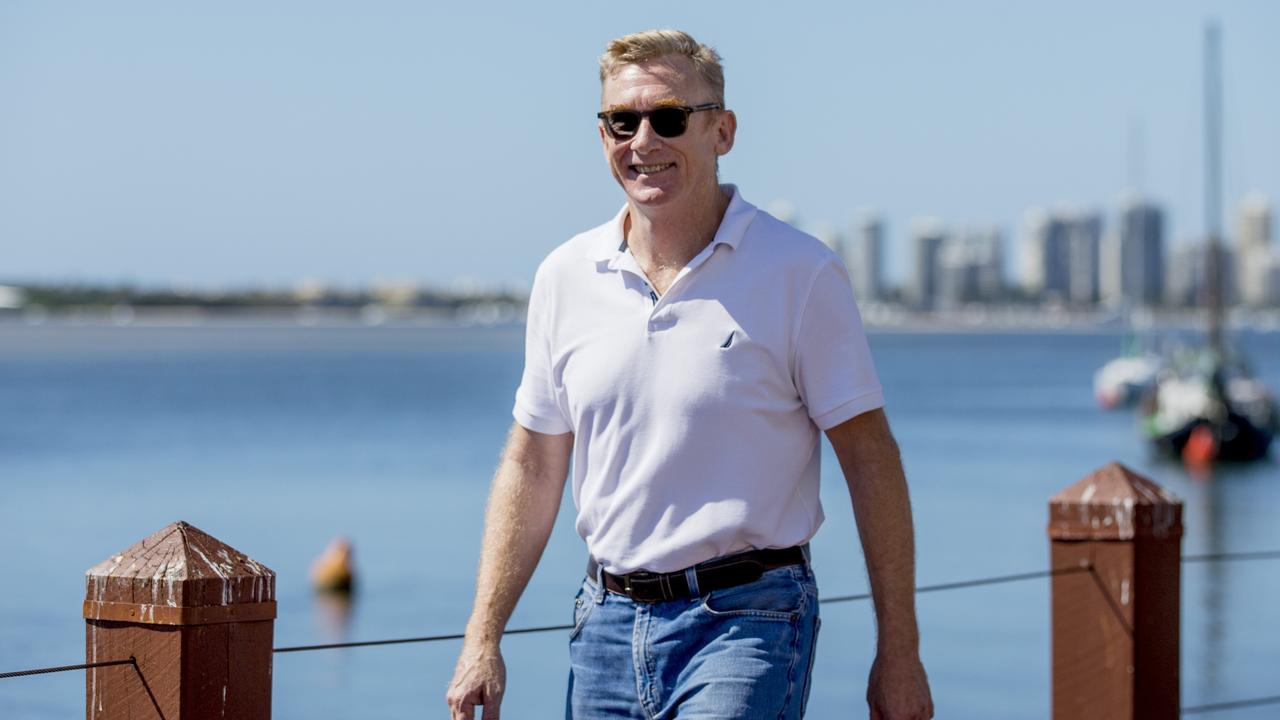
TOM TATE AND DALE DICKSON
GCB: What are your thoughts about working with Mayor Tom Tate? And your opinion of Dale Dickson, who served as CEO for 18 years. You would have had contact with them when you worked on projects?
DE: Dale, I have had the pleasure of working with, particularly with the Commonwealth Games infrastructure. I’ve always found Dale fantastic to work with. He really did have the city first and foremost in his heart. I’d pay tribute to Dale for what he has done, I’m fortunate enough to walk into an organisation that is in really good shape. And that’s a credit to Dale’s administration. I’d like to think I could build on his legacy. We obviously have different strengths and weaknesses. He’s left the council in a fantastic situation to build upon that. I hope to be able to catch up with Dale and for him to give me some advice on his experience. I think it’s important you share the good and the bad among CEOs.
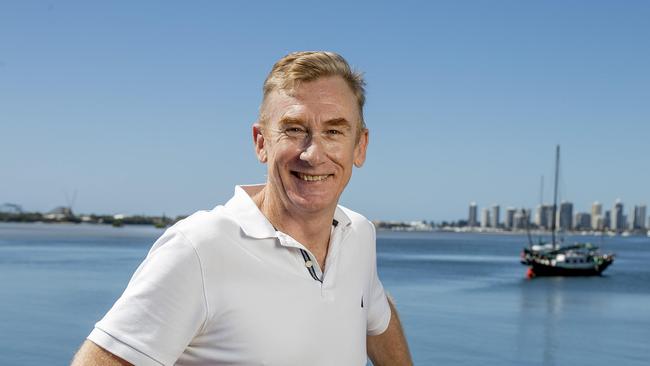
GCB: And Tom Tate?
I like politicians who are keen to have fearless and frank advice. That’s what I’m used to with Ministers who respect me because I give fearless and frank advice about their options. The impression I’ve had from working with the Mayor, he wants to be fully informed. He’s got a vision for the city. But in making decisions that politicians make he wants to be fully informed about the pros and cons of all options. He’s an affable guy. He’s courageous, I like that in a politician. He doesn’t shy away from difficult issues.
WHAT HE WANTS TO ACHIEVE
GCB: I guess at this point in your career you want to see some things achieved in the next couple of years?
DE: I’m 55 in April and this is probably the opportunity for me in a big way in what could be my last role before I retire. I think Tom has a similar view. He’s been in for two terms now and he also wants to make sure he leaves a decent legacy too. I think we will work well together. But I’m conscious the Gold Coast isn’t one city so to speak, it’s a series of villages. I have to work very close with the councillors too. What happens down the south end of the Coast is different to what happens in the north end.
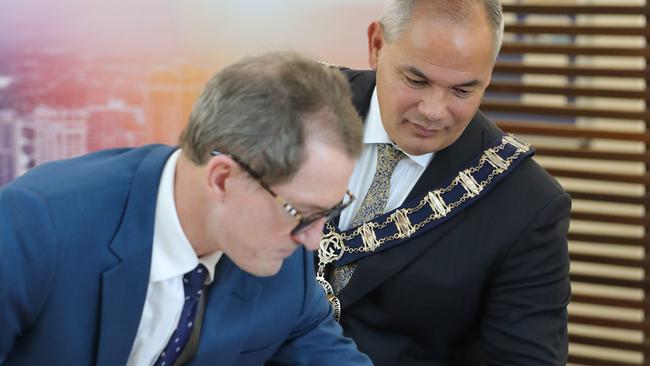
PRO AND ANTI-DEVELOPMENT GROUPS
GCB: With the announcement of your position, the Coast is a place with a lot of noise from people about pro-development and from people who are in anti-development groups. There have been some negative comments on some Facebook groups and some extremely positive comments. What’s your take on the reception?
DE: If we want to keep the lifestyle and amenity the Gold Coast was built on, we have to do a couple of things. We have to make sure the council is in a sound financial position, so it can keep reinvesting in that infrastructure and service. And secondly, we have to make sure also the rate base grows and the economy deepens. Now that has to be balanced with environmental considerations. Because if we go down the path of growth for growth’s sake we will compromise lifestyle and amenity. And as I said before that will kill the goose that killed the golden egg. Hey, I’ve worked with community groups, environmental groups and traditional owners, the last five years in Cairns, my work with eco-tourism there I went and saw the environment groups first.
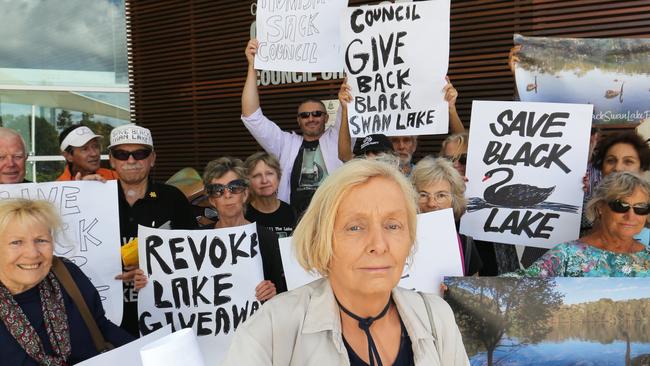
GCB: So you will knock on the door of environment groups here?
DE: One of my strengths is working with stakeholders. I will be going to see those groups. I’m sure we can find some areas we agree with, there might be some areas we don’t agree with. I can stress to them if we don’t maintain lifestyle and amenity and the pristine environment we have here, the Coast will suffer in the long term.
MISCONDUCT INVESTIGATION
GCB: The misconduct investigations — I have a full statement from you we can make available — what happened, what is the background to all of that?
DE: I’d really like to refer to my full statement. I’ve said a bit in the statement about the nature of the allegations and conduct of the investigations. As I said in my statement I’m considering some legal options and it would be inappropriate to comment at this stage.
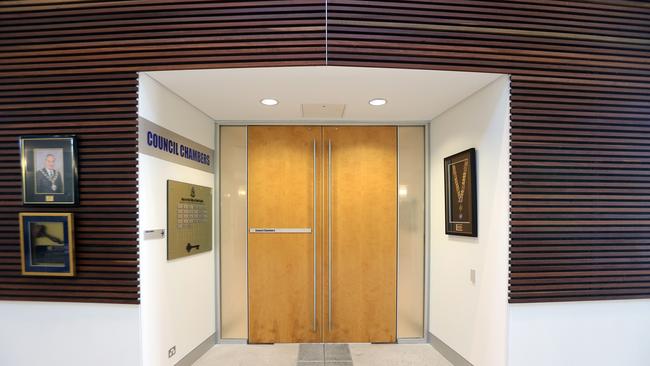
GCB: I understand the mayor’s office did a full check on your background and you will have a pecuniary interests register at council which will be made public which people can see?
DE: The matter, as I said, I was under no obligation to disclose. But out of respect for the Mayor and the council and also the three not-for-profits that I chair and am on the boards of, I wanted to make sure there was full disclosure. I encouraged the Mayor to take that away and seek advice, which he did, and he was of the view there was nothing to stop me undertaking the role. And that’s where I’d like to leave it at this stage.
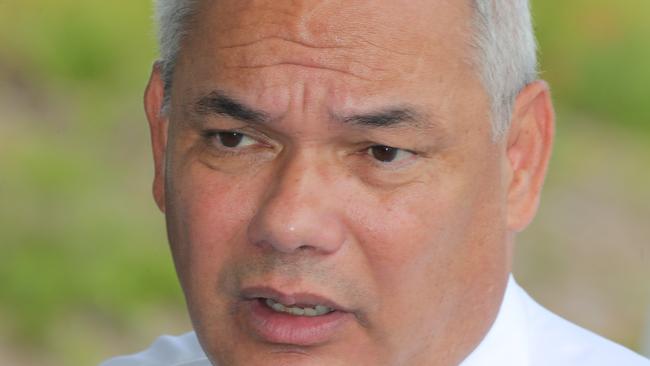
POLITICAL AGENDAS
GCB: I spoke Mayor Tom Tate about the reporting of your family’s property interests in Springbrook and he had this to say about your role: “The CEO fits in to deliver the elected wing of council. So all the things that the councillors and myself took to the election and found dear to our heart, he is to execute it and deliver it value for money.”
His comment was it was that it’s not your interests so much that would be driving the agenda, it was actually the “political wing” which would drive the issues. Your take on that?
DE: I guess because I’ve had a long career in ranks in the Queensland public service, that’s how we operate. At the end of the day our political masters line up every election and are judged on the decisions they make. My role is to ensure they make informed decisions. So if the Mayor and councillors have ideas and initiatives, it’s my role to give them the best quality information they can get to make a decision. Now sometimes I might not agree with the decisions. But they are the elected officials. At the end of the day I have to implement the policies that they decide. My father, who I’m very fond of, has told me lots of stories. When he became a Minister in 1974 at the age of 39, the youngest minister ever appointed, his Director-General sat him down and said “Minister at the end of the day you make the policy.
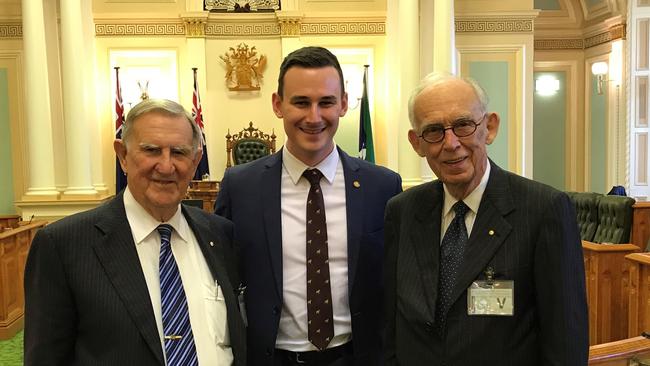
We will give you all the advice you need to make the decision. But a the end of day you make the decision and we will implement it to the best of our ability”. But the Director-General said “We ask just one thing. At the end of the day in a respectful way we have the ability to tell you we told you so”. I’ve never forgotten that. And I think that is what I will do with the Mayor and the councillors.
GCB: I think we saw that with Black Swan Lake, the most divisive issue where Dale Dickson put up a report, with three options including either filling the lake or keeping the borrow pit. At the end of the day it was a council vote that made the decision.
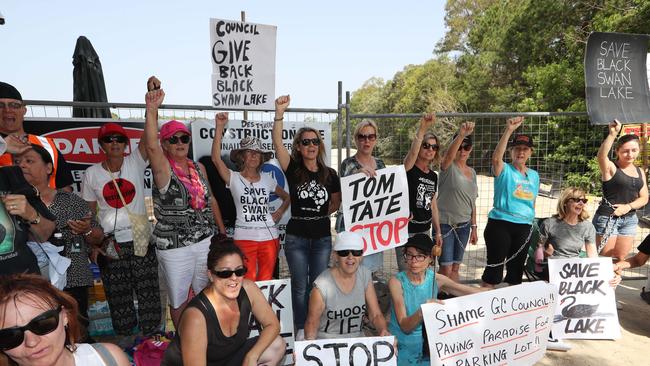
DE: That’s how it is. Poor policy is where public servants try to second guess what their political masters want and present an option that they think will be accepted. That’s not my role. My role is to provide fearless and frank advice so they can make an informed decision. When you have bureaucrats telling their political masters what they want to hear the system will break down.
GLOBAL TOURISM HUB
GCB: You were involved in the global tourism hubs in Cairns, the one which didn’t take off down here, and the Wangetti trail in north Queensland and finally Queens Wharf in Brisbane. How do you think the GTH in Cairns and Queens Wharf will hurt the tourism industry here?How could we best fight back from those new developments when international tourism kicks in?
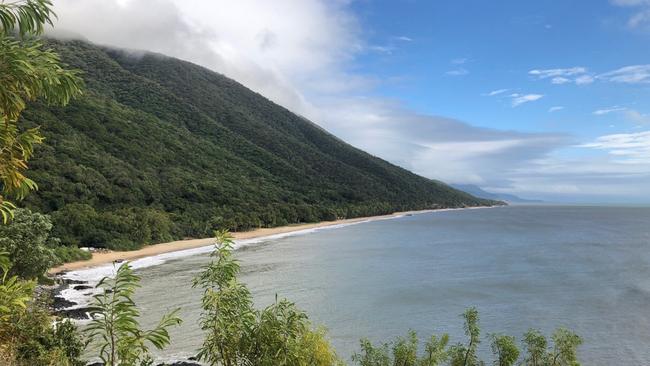
DE: When we implemented the Queens Wharf project my initial brief when the Deputy Premier walked out of Cabinet was to redevelop the government precinct. We spent a lot of time working out what would be best for that site. It soon became apparent to us that Brisbane, because it didn’t have a lot of good quality hotel rooms, a lot of good attractions, people would fly into Brisbane, stay a night and head to the Gold Coast or go to the Great Barrier Reef. The Queens Wharf initiative — everyone thinks of it as a casino — it’s really about the five new hotels, about the public realm, it’s about the food and beverage offering and the entertainment. So we can actually get high value tourists come to Brisbane and spend more. I’d like to do that in other places in Queensland but based on their competitive advantages.
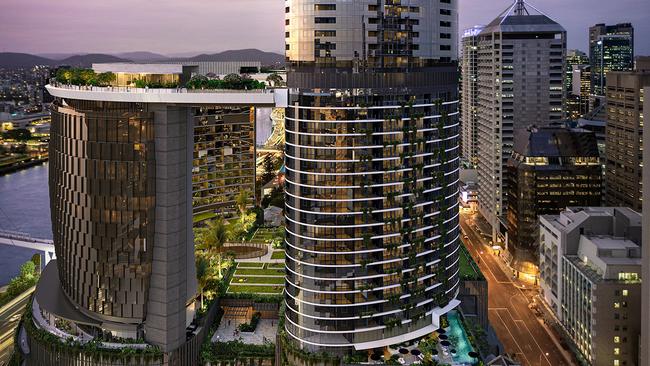
GCB: On the Gold Coast?
DE: I think we need to look at how we can diversify tourism offerings. We need people to stay longer and spend more. To do that you need more attractions and more infrastructure. So the GTH down here, a controversial project, that wasn’t my idea, I was implementing government policy. For example, the Wavebreak Island (casino-cruise ship) proposal when it came across, I used to live across the water from there. My personal view on the development on Wavebreak Island might not have been consistent with the government but it is my job to implement that.
GCB: Will Queens Wharf have an impact on the Gold Coast?
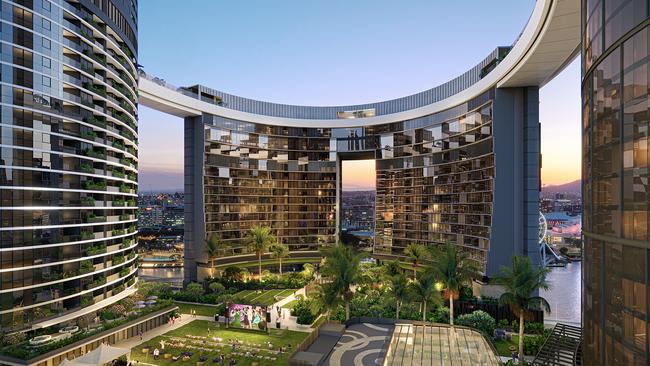
DE: Only if we let it. I’m a big believer in competition. If we have a new resort up there with new hotel offerings, well that’s a challenge for us to respond to that. I’m not saying another casino. I’m saying other attractions that people fly in from overseas go there will say we want to do down the Gold Coast, we want to do more things. I don’t see it as a threat. I see it as a drawcard to get more tourists that we can leverage from and get down to the Gold Coast.
GOLD COAST CABLEWAY
GCB: Councillors have called for a report on a cableway. What’s your view of a cableway and the eco-tourism offerings that can be developed in the hinterland?
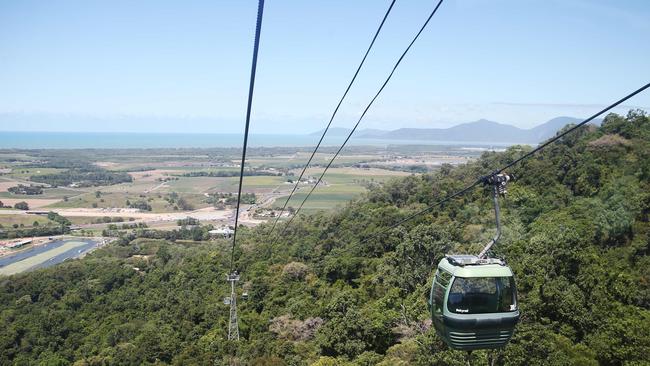
DE: When I moved over and reported to Kate Jones as Tourism Minister, Kate was quite frustrated she as the Environment Minister had changed the laws nine or ten years ago to allow appropriate eco-tourism commercial ventures in national parks to attract more tourists. She did have frustration in all that time that no other project had got up. She gave me that challenge to look at that sector. It became pretty apparent to me that adventure and nature based tourism in and around national parks — it doesn’t have to be in national parks — it is the fastest growing sector. It’s a very lucrative high value sector. It’s a tourist who spends a lot of money. And the Coast is ideally placed to tap into that market. It has the advantage of a large population base. If you are a tourist coming here for a week, I guarantee if we had some good eco-tourism offerings in the hinterland, people would spend a day of their week going up there, maybe extend their holiday and stay a bit more. The good thing about eco-tourism infrastructure is what’s good for tourists is also good for locals.
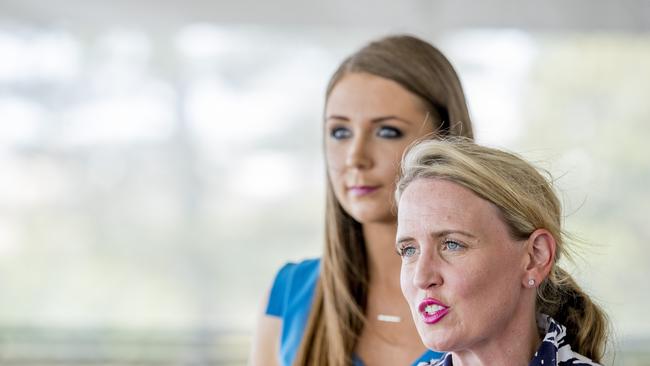
GCB: Is your hope be that the debate doesn’t just completely focus on a cableway and be divisive, and looks at other opportunities like walking trails and mountain bike tracks?
DE: Absolutely. You mentioned Wangetti trail, that’s a really exciting project for me, because that’s in a world heritage management area. But when we developed that project the first people we spoke to was the world tropics management authority, the local traditional owners and the environment groups so they understood what we were going to do. Not many people understand the commercial model we want to have in that project, will give traditional owners up there really meaningful employment, they will be able to work on the adventures, do cultural tour guides, maintenance on the tracks. But the commercial model will also deliver enough revenue to fully maintain that track. It means the parks and wildlife people can divert their very small budget to other priorities because we are bringing in another revenue stream.
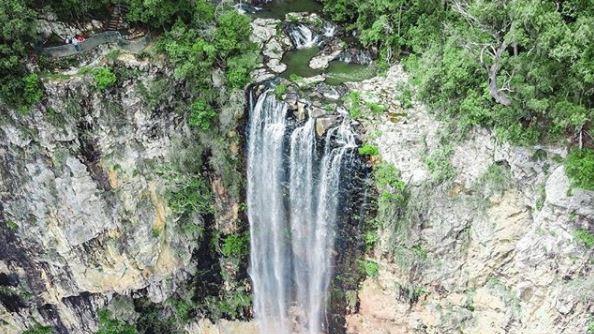
ECO-TOURISM AND CST
GCB: Gaven MP Meaghan Scanlon is the Environment Minister, you have knowledge where government was with eco-tourism, so there is an opportunity for council there?
DE: Yes, and fortunately because I’ve worked in State Government for a long time and my age, I’ve got a lot of colleagues in senior levels of the public service. I’ve met with Meaghan when in the State public service and briefed her, and she is a really an asset for the Gold Coast. She understands eco-tourism done in the right way will benefit the economy and benefit the environment too. We need additional revenue streams to maintain the asset we’ve got.
GCB: One of the challenges that could face you is Philip Park on the Spit. There are a number of options there. A cruise ship terminal, it (the area) could be just improved, or become an indigenous learning centre. The Government will make a lot of decisions on that around the Spit master plan. Would you handle that like you explained earlier?
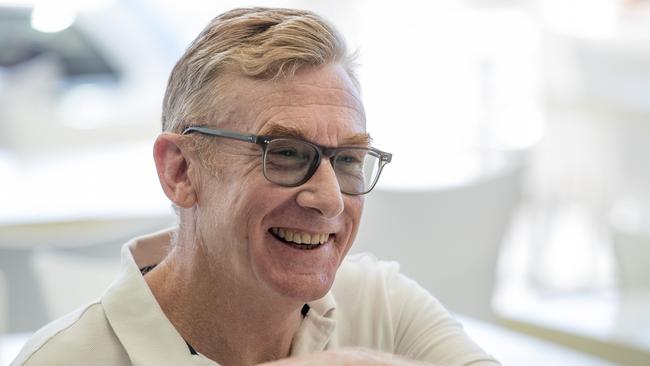
DE: I’ve got the scars to prove my experience on development on the Spit as you know (laughs) . The big thing with all, it sounds simple stuff. A lot of people concentrate on what’s afoot there rather than what does the market demand, and how can we make it an ongoing sustainable viable enterprise. I would urge people to consider from the very word about what can we put up there that’s sustainable. The last thing we want to do is build something that is not going to attract ongoing support. So I’m an economist, and you should always start from demand. And when people build tourism initiatives because they think people will come to them, that’s when you do get white elephants around the place.
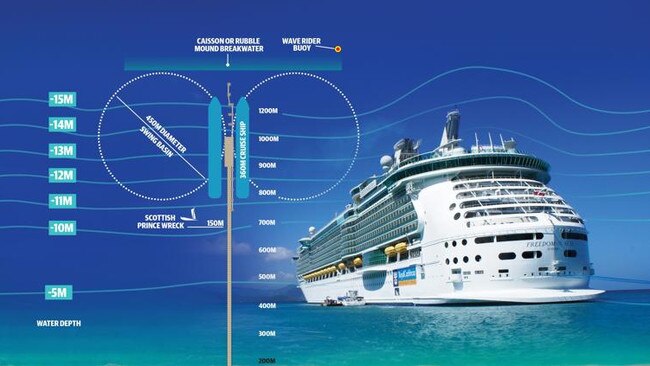
But look — I think it’s a great thing the Spit has been preserved the way it is. Someone has finally come to the table and said this is the future for the Spit, when for a long time we had uncertainty. I would really like to be involved in contributing to what would go best on the Spit. But again whatever we do up there, let’s just not think of the tourist but let’s think of how the locals can benefit from it as well.
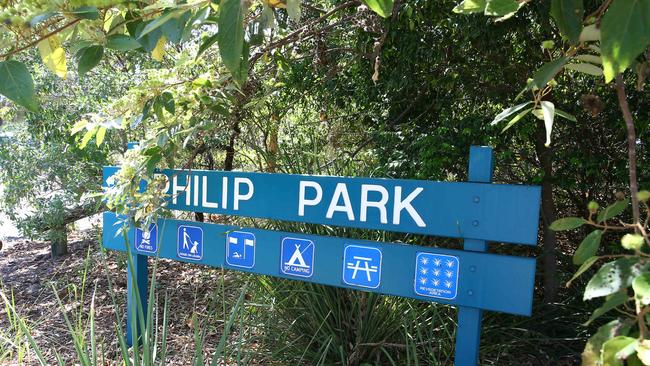
GCB: Apart from the eco-tourism (opportunities) you talk about, that area at the Spit is going to help the Coast in terms of the Queens Wharf effect and Cairns impact?
DE: And I stress, it’s easy to declare national parks and reserves. The hard part is ensuring there is a revenue stream to maintain it in an ongoing way. And so I will keep banging on about that. We can make it a beautiful park up there, but how can we maintain it without it being an extra burden on the ratepayers of the Gold Coast. That’s where we seek the State Government, the people driving this process, I’d be urging them to consider this as well.
GCB: You are the son of Sir Llew Edwards, former deputy premier and architect of the hugely successful Expo 88. And despite your family’s Liberal background, your career climbed during Labor’s long term in office. You can work with both sides. What will it be like trying to work with 14 independent councillors who have been described to me as “individuals with strong egos who have won popularity contests in their suburbs”?
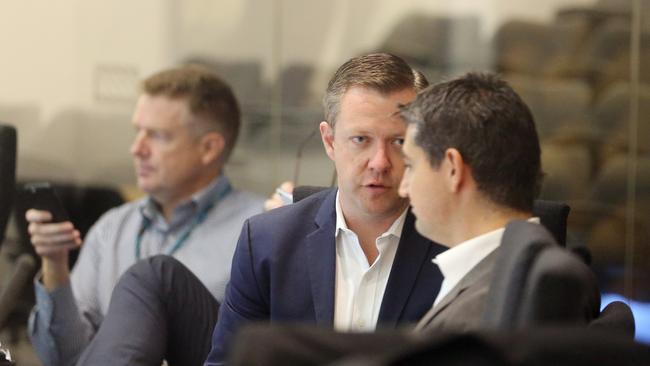
DE: (Laughs). It’s funny because my father went into politics when I was six years old, in grade one. He left politics when I was in grade 12. You grow up in politics and whether you like it or not you absorb the fact that successful politicians are the ones that keep close to their communities, and reflect what their communities like and want. I respect that. Therefore it’s my role to not only working effectively with the mayor but work with 14 councillors and what they are wanting to achieve with their communities. In many ways it’s like being in State Government where yes, I report to my minister, but when I’m doing projects up in far north Queensland for example I was constantly in contact with the three or four local members up there. You know a lot of public servants would think that is inappropriate but I knew that for my projects to be successful I had to talk to the members up there. It’s part of my DNA to directly deal with politicians. If you sit in your office and not actually smell the roses now and again, and what’s really happening out there, you can get out of touch pretty quickly.
GCB: You like that street parochial politician?
DE: When I was doing my work in far north Queensland I made sure I was up there a couple of days every fortnight. I didn’t fly in, fly out, I spent time in the community there, I’ve developed some great friendships there do this day I will miss greatly.
GCB: You grew a beard?
DE: (Laughs) I did.
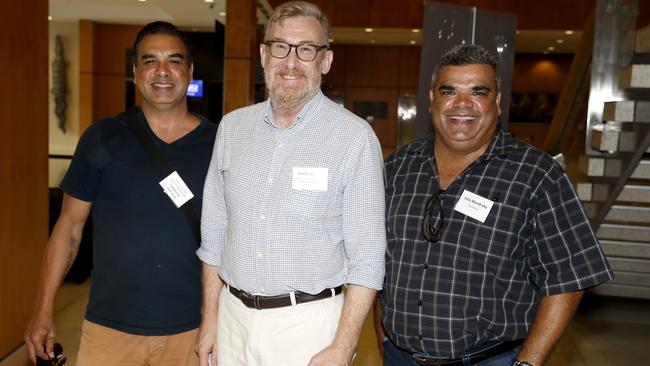
COUNCIL BUDGET
GCB: One of your first tasks is probably bedding down the budget for the second largest local authority in Australia. How challenging will it be — and the administration really sets the framework for it so things can work — how will you deliver a rates rise in line with CPI? You will have to while providing massive transport upgrades to link with projects like the Coomera Connector along with providing (smaller stuff like) enough suburban bus shelters and lighting for sporting fields?
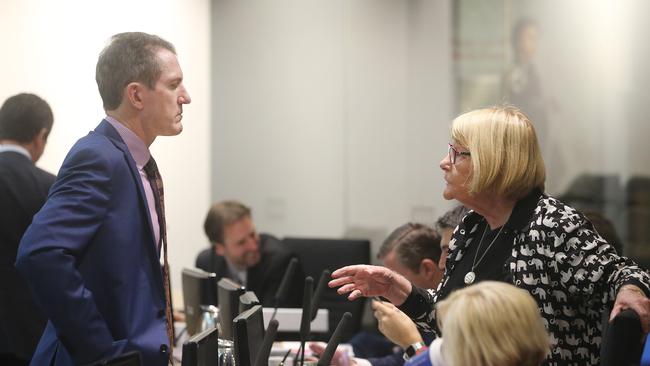
DE: It is a challenge. I’m the first to say I’m not across every aspect of the budget at this stage. But I have had a look at the previous budgets. It’s a challenge when you deliver normal development you get infrastructure charges that developers rightly pay. You deliver community infrastructure you don’t get that infrastructure charge back. Community infrastructure is important. But the budget has to be able pay for that in some way, shape,or form. That’s one of my priorities is not only look at the budget as next year’s budget, but in parallel to that have a long term financial plan that looks beyond a one year or three year budget cycle. That means we have a longer term view that we can actually afford to spend the money on infrastructure and services. I will be looking at how we can make council work better and smarter. It’s not about cutting things, it’s about doing things smarter with systems and information technology. Just different ways of doing service delivery. I will be looking to get efficiencies out of council through the budget process. But also we will be looking at how the council needs to position itself in ten years time to be financially sustainable.
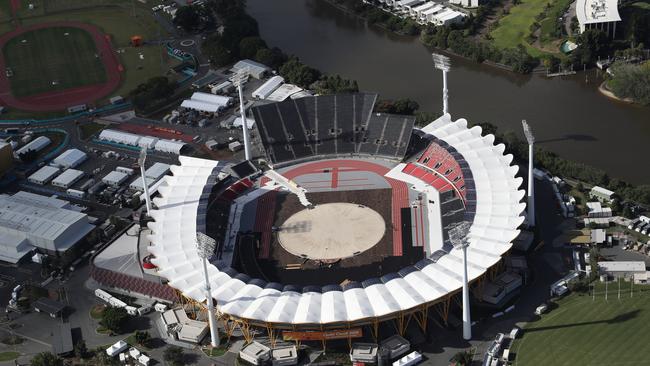
OLYMPICS 2032
GCB: In the back of your mind I imagine there is already the Olympic bid?
DE:Yes, I was lucky enough to deliver Commonwealth Games infrastructure through my department. I’m very aware of the role council played in that. I’ve spent a lot of time as a State Government bureaucrat watching various cost shift arrangements being imposed on local government though these big ideas. One of things that I will guard against is the State and Commonwealth governments attempting to shift costs to the local government through these big ideas. So I support the Olympics but I need to make sure it works for the people of the Gold Coast — they contributed a lot through the Commonwealth Games. If we can get the big investments in infrastructure that are being talked about, that will be fantastic. But I have to be sceptical, That’s my job. I have to be cautious, that’s my job. We need to get more information before we are 100 per cent committed. We’re committed but my role is to make sure the ratepayers don’t get stiffed on the process.
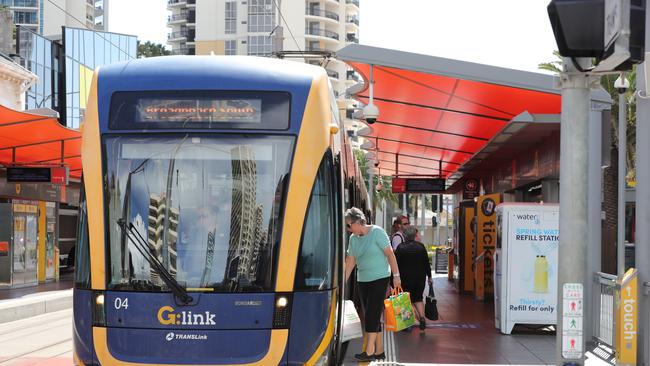
GCB: We’ve already got great venues and we have hotels, the advantage for us would be getting some transport benefits?
DE: Without doubt. If we can fast track some of the transport projects that the Coast really deserves, that’s a great outcome. Light rail is a great example of that. Let’s get the subsequent stages done, because I haven’t seen a more successful public transport initiative in Australia than the Gold Coast light rail. I think we should build on that success. The duplication of the M1 is another obvious one we need to get cracking on that.
GCB: What message would you send to the 3500 odd staff at City Hall, some who have worked all their life under one boss?
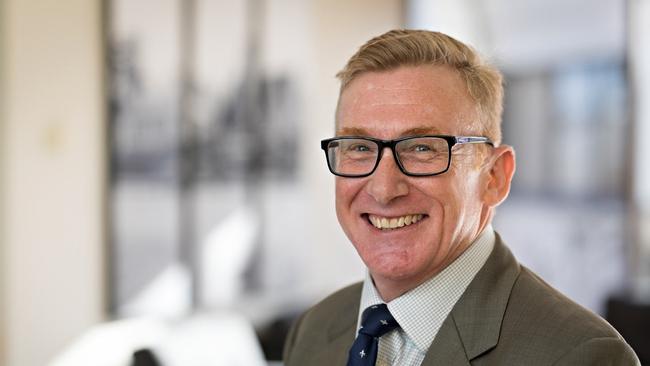
DE: Well look, I’d pay tribute to the job Dale has done. I will probably bring a different style to Dale, in some ways. I’m an engaging person. I’m also someone who is known to set what objectives need to fired and then give people responsibility and accountability to get on with the job. I’m no micro manager. I will be looking to learn from those people about where they would like to take council to the next stage. Most innovations in organisations occur at the workplace level, it’s not from the CEO or leadership team. It’s through people in the trenches delivering the infrastructure and the services. I’d be hoping to provide them with an opportunity to bring some innovation and new ways. Because the people who work in public service, the vast majority of people, whether it’s State, Commonwealth or local, they are in it for the right reasons. They want to serve the public, and there are ways we can serve the public more.
PW: So we are looking forward, several years from now, when your first contract ends, what do you think will be your biggest achievements?
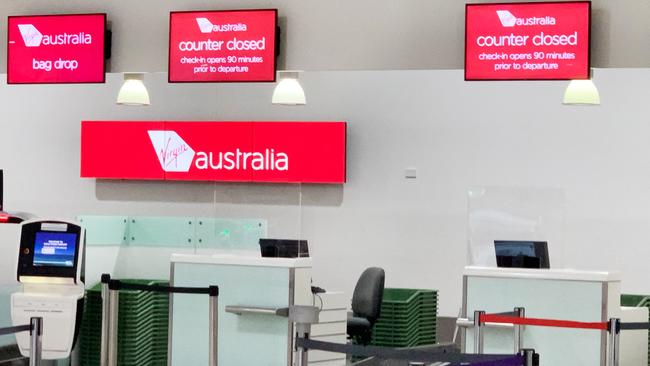
DE: I’d like in some way shape or form ensure that the amenity and lifestyle we have at the moment on the Gold Coast is not diminished in any way, is enhanced. How we will measure that, I’m not sure. I’d like to see a diversification of the tourism product on the Gold Coast. I’d like to see us aggressively move out of COVID. I think the Coast has a real opportunity. When international borders are open I believe there is going to be a flight to safe havens. Australia will be one of those safe havens. At the end of four years I would like to see the Gold Coast punching above its weight, in taking advantage of that post-COVID opportunity. Also COVID shows we still have a narrow economy, we are still very much reliant on construction, consumption, tourism, and to a lesser extent education.
PW: We have a breathing moment and the worst thing we could do is say this will be the normal forever and fall asleep at the wheel?
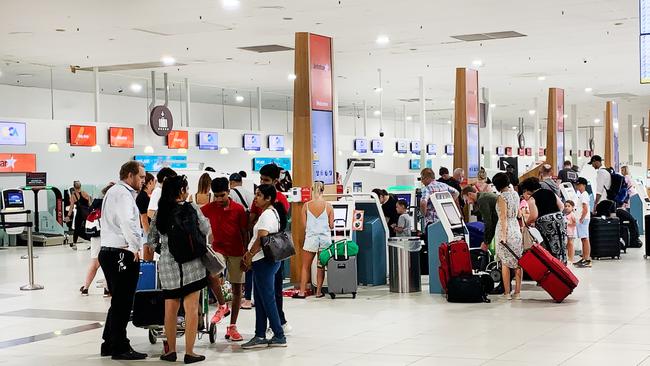
DE: Exactly, we should be getting ready to aggressively come out of COVID. We have a great brand, we are a safe place, we have all the attributes that both tourists and investors are looking at. Already I know there are companies in NSW and Victoria who are looking to relocate. We have people from the southern States enjoying Queensland and the Gold Coast at the moment. Well, bring your business as well as yourself.

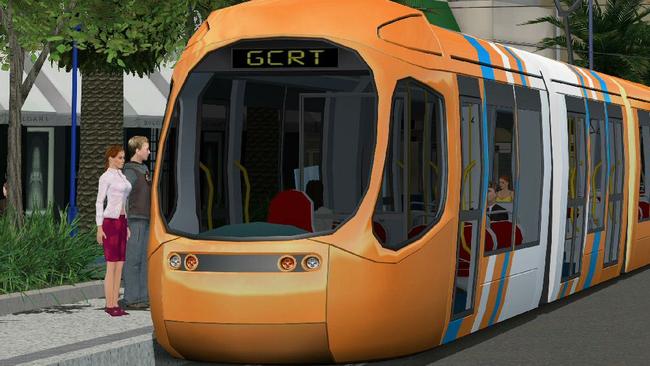
Add your comment to this story
To join the conversation, please log in. Don't have an account? Register
Join the conversation, you are commenting as Logout
Fee-free nursing diplomas won’t fix the choke point, locals say
The state government is to scrap fees for nursing diplomas as Gold Coast hospitals grapple with soaring demand and a shortage of frontline staff. But graduates and recruiters say this won’t necessarily fix the bottleneck. HAVE YOUR SAY IN OUR POLL
Miami bars unite for biggest party
Miami’s annual Christmas party will be its biggest yet when it takes over breweries and bars in the affectionately known Liquor Lanes.